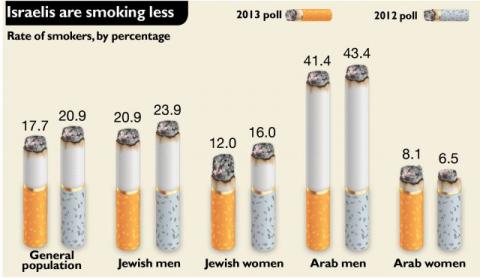Rate of Israeli smokers dropped 14% in 2012, survey shows
These results reflect a drop from the previous year's survey, which showed that 20.6 percent of the adult population were smokers. (In this survey, 27.2 percent of men and 14.5 percent of women, 19.8 percent of Jews and 24.9 percent of Arabs were smokers.)
The report also shows that in 2012, Israelis consumed 415 million packs of cigarettes, down from 426 million in 2011 (a drop of 2.7 percent).
At the same time, in 2011 tobacco companies’ expenditures on advertising, sponsorships and sales promotion amounted to NIS 54.5 million, an increase of 6 percent relative to 2010.
However, the Health Ministry clarified that the new findings may have been skewed as the recent survey examined Israelis exercise regimens and included questions about smoking. The ministry also said that respondents were informed of the content of the survey ahead of time, which may have influenced the number of participants with a greater awareness of the risks associated with smoking.
More taxes and graphic warning labels
In recent years, the tax on cigarettes has increased, including last month as part of the economic measures and reforms introduced by the new government. In 2012, Israeli households spent an estimated NIS 7.1 billion on cigarettes and the state’s revenues from the taxes on those cigarettes amounted to NIS 5.3 billion, as compared to NIS 4.1 billion in 2009.
Alongside the tax hikes, there have been additional efforts to combat smoking in Israel. The Ministerial Committee for Legislation on Sunday approved another proposed law, which would significantly limit cigarette advertising and stipulate that cigarette packets in Israel picture sick people, as is done in a number of Western countries.
In the past decade the number Israelis who smoked 10 to 20 cigarettes a day has remained steady, while heavy smokers – those who consume more than a pack a day – saw a greater decline, in all the population groups except for Arab women.
In recent years the average age for smoking that first cigarette has stood at 17.9 years among Jewish men, 20 among Jewish women, 19.2 among Arab men and 25.2 among Arab women. In a comparison to the member countries of the Organization for Economic Co-operation and Development, the proportion of smokers among Israeli men is close to the average (25.9 percent) while the proportion among women is low compared to the average (16.7 percent).
The Israeli survey, meanwhile, also highlights the continuing trend of exposure to passive smoking, which is also considered harmful. According to the survey, 41.2 percent of Arab women are exposed to second-hand smoke in their homes, as are 18.8 percent of Arab men, 18.6 percent of Jewish women and 11.6 percent of Jewish men.
The survey found that Tel Aviv is the leading city in Israel in terms of enforcing the public smoking ban: It issued 2,909 fines to smokers and business owners who violated the law, among them 1,431 fines to smokers in restaurants and cafes.
Tobacco kills nearly six million people each year, of which more than 600,000 are non-smokers who die from breathing second-hand smoke.
Dan Even

